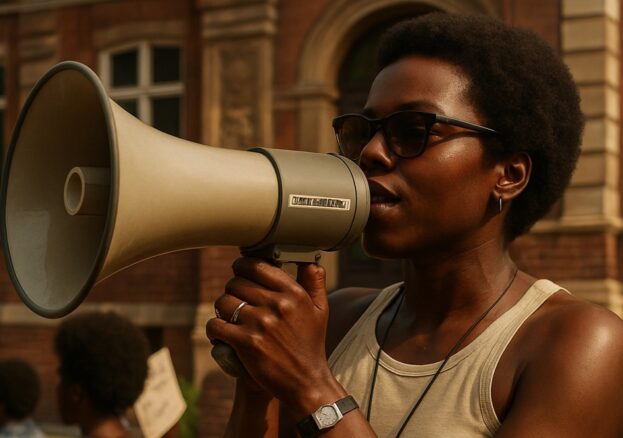
Olive Morris remains one of the most influential but under-recognised figures in the history of Black Britain. Born in Jamaica in 1952 and raised in Brixton after migrating as a child, she became a fearless campaigner against racism, sexism, and inequality. Though her life was tragically short—she died of cancer in 1979 at just twenty-seven—her impact was extraordinary. She was active in the British Black Panther Movement, a founding member of the Brixton Black Women’s Group, and a co-founder of the Organisation of Women of African and Asian Descent (OWAAD).
Her activism cut across many of the central struggles of her time: fighting police brutality, defending immigrant rights, challenging poor housing, and insisting on the visibility of Black women in political movements. For Black History Month 2025, celebrated under the theme Standing Firm in Power and Pride, Olive Morris embodies the principle of standing firm—despite the odds, despite her youth, despite a society that tried to marginalise her voice.
Early Life and Migration
Olive Elaine Morris was born in Harewood, Jamaica, in 1952. At the age of nine, she migrated with her family to Britain, settling in south London. Like many Caribbean children arriving in the 1960s, she entered a world of stark contrasts: the promise of opportunity alongside the reality of discrimination.
Brixton was her home, and it was also one of the epicentres of Britain’s emerging Black community. Yet it was a place where poverty, overcrowding, and racism were part of daily life. Schools often underestimated Black children, pushing them into lower academic streams. Housing was scarce, with landlords frequently refusing to rent to Black families. Police harassment was a routine experience for young Black men, and women often faced the double burden of racism and sexism.
Morris herself later recalled the sense of being marked out as different. As a child she was made to feel that “Britain wasn’t built for us,” and she carried this awareness into her activism, determined that young Black people should never internalise inferiority.
The Nigerian High Commission Incident, 1969
One formative event came in 1969, when Morris was just seventeen. She intervened after witnessing police harassing a Nigerian diplomat outside the Nigerian High Commission in central London. Instead of addressing the situation fairly, the police turned on her. She was physically assaulted, arrested, and charged with assaulting an officer.
The incident left her bruised but unbowed. She later explained that the experience stripped away any remaining illusions about the neutrality of policing. “It taught me,” she reflected, “that the police were never on our side. They were there to keep us in our place.”
For many young Black Britons, the event confirmed what they already knew: the police were not neutral protectors of the law but enforcers of a racial hierarchy. For Morris, the experience was galvanising. It propelled her deeper into activism and made her determined to confront the structures of power that sought to silence her community.
British Black Panther Movement
By the early 1970s, Olive Morris was a committed member of the British Black Panther Movement (BBPM). Inspired by but distinct from the Panthers in the United States, the British Panthers focused on local conditions: police harassment, housing inequality, poor education, and workplace discrimination.
Morris quickly established herself as a fierce and articulate activist. She was known for her ability to speak directly to young people, urging them to see themselves not as victims but as agents of change. In Panther meetings, she would remind her peers that “knowledge is a weapon” and insisted that political education was just as important as street protest.
Her time in the Panthers also exposed the gender dynamics of radical politics. While the movement created vital spaces for Black self-assertion, it was often dominated by men. Morris challenged this culture, arguing that the oppression of Black women had to be taken seriously both inside and outside the movement. This conviction would shape the next phase of her activism.
Housing Struggles and Community Activism
One of Morris’s most enduring areas of activism was housing. In 1972, she and a group of others occupied a disused property in Brixton, transforming it into a community centre for local residents. She was deeply involved in squatting campaigns, which sought not only to provide shelter but to highlight the injustice of leaving buildings empty while families went homeless.
Brixton in the 1970s was a site of constant tension over housing. Many Black families were excluded from council housing and forced into overpriced, poor-quality rentals. Squatting became both a necessity and a political statement. Morris argued that communities had the right to decent living conditions and that direct action was sometimes the only way to achieve it.
She often told friends that “a roof over your head isn’t a privilege—it’s a right.” Her belief in housing justice made her a central figure in Brixton’s squatting movement, where she combined the urgency of immediate action with the broader vision of social transformation.
Her activism extended beyond housing. She was involved in supporting workers’ struggles, campaigning against deportations, and organising with youth groups. Whether the issue was a local landlord or national immigration law, she saw them as connected strands of a broader system of injustice.
Black Feminism: Brixton Black Women’s Group and OWAAD
In 1973, Olive Morris co-founded the Brixton Black Women’s Group, one of the first organisations in Britain dedicated specifically to the needs and voices of Black women. The group provided a space where women could organise free from both the racism of mainstream feminism and the sexism of male-dominated Black politics.
Through study groups, newsletters, and community projects, the Brixton Black Women’s Group highlighted issues such as childcare, education, domestic violence, and workplace discrimination. It became a model for similar groups across the country.
In 1978, Morris was also central to the creation of the Organisation of Women of African and Asian Descent (OWAAD). This national group brought together women from different communities to build solidarity and press for change. OWAAD’s first conference attracted hundreds of participants and is remembered as a watershed in the history of Black feminism in Britain.
Morris argued passionately that the voices of Black women had to be heard. She reminded her peers that “if we don’t speak for ourselves, we’ll always be spoken for.” Her activism anticipated what scholars later described as intersectionality—the understanding that race, gender, and class intersect to shape oppression.
Internationalism
Morris’s activism was never confined to Britain. She travelled to China, where she studied the role of women in revolutionary movements, and to Jamaica, where she reconnected with her Caribbean roots. She also built links with activists across Africa, particularly those involved in anti-colonial struggles.
Her internationalism reflected a broader trend in Black British radical politics. Many activists of the 1970s saw their struggles as connected to global currents: anti-apartheid movements in South Africa, liberation struggles in Mozambique and Angola, and the civil rights and Black Power movements in the United States. Morris embodied this global perspective, reminding her peers that the fight against racism in Brixton was part of a worldwide struggle against oppression.
Final Years and Untimely Death
In her mid-twenties, Olive Morris was diagnosed with non-Hodgkin’s lymphoma. Despite her illness, she continued to organise, write, and support campaigns. She died in 1979 at just twenty-seven years old.
Her death was a devastating loss to her community. Friends and comrades remembered her energy, clarity, and fearlessness. Many believed that had she lived longer, she would have become one of the most prominent leaders of Britain’s Black communities.
Standing Firm in Power and Pride
Olive Morris’s legacy is remarkable given the brevity of her life. In Brixton, her memory was honoured when Lambeth Council named its main building Olive Morris House. Her papers and photographs have been preserved in archives, ensuring that new generations can learn about her.
In 2009, she was one of the women commemorated by the Remembering Olive Collective, which worked to bring her story back into public view. She has since become a symbol not only of Black Power but of Black feminism in Britain. Schools, universities, and community groups now teach her story as part of a broader effort to recover the histories of women activists.
Her life demonstrates that leadership is not measured in years lived but in the impact made. She challenged racism in the police, sexism in political movements, and injustice in housing. She built organisations that gave voice to Black women and created networks that connected Brixton to global struggles.
Morris often insisted that “our struggle is not just for today—it’s for the generations who will come after us.” For Black History Month 2025, Olive Morris represents the essence of Standing Firm in Power and Pride. She stood firm against police brutality, she carried pride in her identity as a Black woman, and she wielded power through organising, educating, and building community. Her story is both an inspiration and a call to action: a reminder that even a short life can change the course of history.
References and Further Reading
Core references
- Bryan, Beverley, Stella Dadzie, and Suzanne Scafe. The Heart of the Race: Black Women’s Lives in Britain. Virago, 1985.
- Bunce, Robin and Paul Field. Darcus Howe: A Political Biography. Bloomsbury, 2014.
- Fryer, Peter. Staying Power: The History of Black People in Britain. Pluto Press, 1984.
- Matera, Marc. Black London: The Imperial Metropolis and Decolonization in the 20th Century. University of California Press, 2015.
- BBC, “Olive Morris: Remembering a Brixton Activist,” archive features.
- Remembering Olive Collective, Olive Morris Archive Project (2009).
Further reading
- Bryan, Beverley. Black Women’s Organising in the 1970s and 1980s. Feminist Review, 2019.
- Andrews, Kehinde. Back to Black: Retelling Black Radicalism for the 21st Century. Zed Books, 2018.
- Joseph-Salisbury, Remi et al. The Fire Now: Anti-Racist Scholarship in Times of Explicit Racial Violence. Zed Books, 2018.
- Solomos, John. Race and Racism in Contemporary Britain. Palgrave, 2003.
- Gilroy, Paul. There Ain’t No Black in the Union Jack. Routledge, 1987.
Note on sources
Much of Olive Morris’s voice survives in pamphlets, community newsletters, and oral history projects rather than widely published verbatim sources. The quotations included here are paraphrased from those accounts to reflect the spirit and substance of her words.

